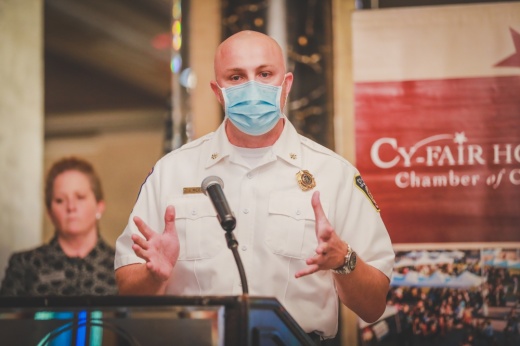“Hands down, the worst I’ve ever seen in my career, and I just can’t fathom seeing it [get worse]. To get worse than what it is right now is a complete failure,” Reed said in an Aug. 19 interview with Community Impact Newspaper. “We’re managing, but anything worse than this—that’s that tipping point, that’s that breaking point where we start having massive failures.”
As of Aug. 17, there were 39,901 active cases of COVID-19 in Harris County. This includes 6,158 across the 10 ZIP codes that fall within Cy-Fair ISD’s boundaries. More than 450 Cy-Fair residents have died with COVID-19 since the start of the pandemic, and at least 100 of those deaths have occurred in the past three months, according to data from Harris County Public Health. But patients who do not even have the virus are dying due to a lack of resources because the local health care system is inundated as officials manage the most recent wave of COVID-19, Reed said.
“The problem is the surge and the overload on the current health care system—from the EMS providers in the field to the [emergency departments] to the actual ICUs,” he said. “It’s so overwhelmed that a typical patient who comes in from a car accident who may need a massive resuscitation—that in normal times would be just business as usual and they would be absolutely fine—right now the resources just aren't available to give them every chance that we know that we can give them.”
For instance, paramedics typically aim to get a heart attack patient to the cardiac catheterization lab in under 40 minutes, and Reed said getting them in even 10 minutes sooner can make all the difference in that patient’s recovery.
Today, Reed said he cannot guarantee patients will get into that lab within 60 or even 90 minutes. The process takes longer, not because of a shortage of hospitals or of EMS equipment but because of staff shortages, capacity limitations and increased 911 calls.
“Right now, when we take a patient to a hospital, our time on task has increased from an hour from when the 911 call is made until that truck is ready to respond to another call. Now we’re seeing seven hours—seven hours from when you call 911 until your loved one is in a bed in acceptable care, and that ambulance is now available,” he said.
Reed said his department is seeing an uptick in 911 calls from individuals who cannot access routine health care from their regular physician or telemedicine appointments because the health care system is so overwhelmed.
To help alleviate the situation, Reed said the Cy-Fair Fire Department took an “unprecedented” step Aug. 18 and implemented provider-initiated refusals. This means when a patient wishes to be taken to a hospital but their condition does not warrant an emergency room visit, officials are now telling them they will not take them to the hospital.
Cy-Fair Fire Department officials are evaluating the community’s needs and making modifications daily to ensure first responders are available and can provide the same level of service they would before the pandemic. This could mean eliminating certain tasks to allow respite for his team, Reed said.
“I need these guys and gals rested because they’re working hours on end, and so we’re canceling trainings [and] things that aren’t an absolute need-to-have so that they can go home and rest,” he said.
The department typically works with Houston Methodist Willowbrook Hospital, HCA Houston Healthcare North Cypress and Memorial Hermann Cypress Hospital, but Reed said first responders have been forced to expand outside their normal service area.
Reed said his paramedics began transporting patients to a freestanding Memorial Hermann Convenient Care Center in Katy off the Grand Parkway and Westpark Tollway earlier this week.
“We’re having to go to destinations that are further just because every hospital system is just completely at capacity,” Reed said. “And some of the hospitals are calling us and they’re saying, ‘Listen, we’re doing everything that we can. There’s nothing more we can do for four hours. Can you give us a break?’"
Reed said being vaccinated against COVID-19 will likely prevent hospitalizations and death even among those who do contract the virus. But he said even before the vaccine was readily available, the community proved spread could be mitigated, so those who do not want the vaccine for personal reasons still can take other steps to protect themselves and others—including staying home, wearing a mask in public, washing their hands and using hand sanitizer.
“The problem is our playbook has run dry, and so we are now [operating by] trial and error on things," he said. "And the hope is that we as a collective society ... can get a handle on that because we have the solution. We just need to accept it and to lift each other up. The recourse is if we don’t, we will have a catastrophic failure in the health care system.”





